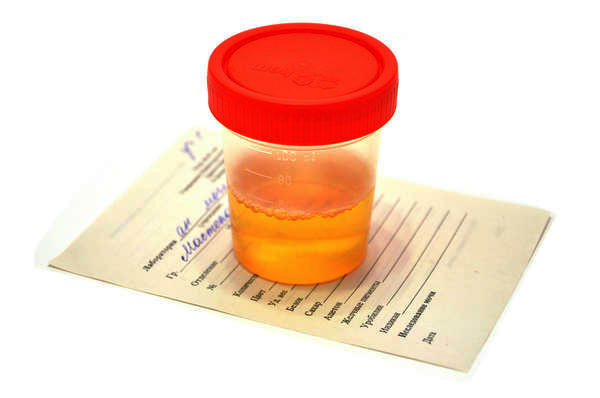 Seeing blood clots in the urine may be frightening, but it is a common problem. Often, when there are many red blood cells in the urine the urine color turns red, pink, or brownish, and this may considered hematuria, a medical term for blood in the urine. However, sometimes there are too little red blood cells in the urine, which cannot be seen by the naked eye. The presence of blood cells in the urine may be detected incidentally on a routine urine test using a microscope, and this is medically known as microscopic hematuria.
Seeing blood clots in the urine may be frightening, but it is a common problem. Often, when there are many red blood cells in the urine the urine color turns red, pink, or brownish, and this may considered hematuria, a medical term for blood in the urine. However, sometimes there are too little red blood cells in the urine, which cannot be seen by the naked eye. The presence of blood cells in the urine may be detected incidentally on a routine urine test using a microscope, and this is medically known as microscopic hematuria.
Hematuria occurs in up to 10% of the population, but only a few (about 3%) will see frank or gross hematuria, which refers to having a large amount of blood in the urine. Seeing blood clots in urine is more common among women than in men and it may or may not be accompanied by pain.
Causes of Blood Clots in Urine
Before discussing the possible causes of hematuria, it is worthwhile to note that the urine may sometimes turn pink, red, or brown for reasons other than bleeding in the urinary tract. This means that in spite of the color, no blood may be found in the urine, and the change in color may be due to:
- Eating large amounts of dark colored foods like beets, rhubarb and berries
- Consuming food or drinks containing food colorings
- Using medications which can affect urine color, such as phenazopyridine
- Having liver disease which can cause discolored urine
Sometimes, menstrual blood may be found in the urine, as well as blood clots from vaginal bleeding, but these are not considered hematuria, since the origin of the blood is not the urinary tract.
Bleeding in the urinary tract can come from any part of this system, from the kidneys to the ureters, urinary bladder, and the urethra. The urine, which is formed in the kidneys, carries with it the red blood cells as it passes along any of these structures. Real hematuria may be caused by many factors, including:
- Urinary tract infection (most common cause in people younger than 40 years old)
- Kidney stones
- Injury to any part of the urinary tract and/or the genitals
- Cancer in any part of the urinary tract (bladder or kidneys) - more common among people older than 40 years
- Cancer of the prostate - common in older males
- Any condition that causes blockage, stricture, or compression of the urinary tract
- Kidney disease
- Disorder in blood clotting
- Non-cancerous tumor or enlargement of the prostate, also known as benign prostatic hyperplasia - also common in older males
- Chronic diseases like diabetes, high blood pressure (hypertension)
- Viral infections
- Certain medications which can cause bleeding, including antibiotics like rifampin, analgesics like aspirin, blood thinners or anticoagulants like warfarin, anticonvulsants like phenytoin, and quinine
- Any factor that causes kidney inflammation (usually unknown cause)
- Strenuous exercise can cause a breakdown of muscle proteins which is manifested as blood in the urine (common among athletes)
Because there are many possible causes of blood in urine, one is advised to consult a doctor for proper diagnosis especially when accompanied by other symptoms.
Symptoms and Signs of Blood Clots in Urine
Finding blood in the urine may be a symptom and could provide a clue to a disease. In people who have gross hematuria, there may be small blood clots in the urine. The amount of blood present in the urine does not necessarily indicate a serious condition. The urine may appear normal in people with microscopic hematuria, and the presence of red blood cells is discovered in a routine urine examination.
Many people with blood in the urine have no other signs or symptoms. However, the presence of other symptoms may be related to the underlying cause of bleeding. These symptoms could include:
- Pain in the side of the body below the ribs

- Pain in the back
- Lower abdominal pain
- Pain in the pelvis or groin
- Burning pain during urination (also called dysuria)
- Fever with or without chills
- Nausea and/ or vomiting
- Decrease in appetite
- Unexplained weight loss
- Cloudy urine
- Frequent urination
- Urgency to urinate
The presence of one or more of these symptoms, together with blood in urine may depend on the cause of the bleeding. For example, people with kidney stones may experience severe pains in the side of the body (flank pains) which may radiate to the groin area or to the scrotum, in males. Fever with chills is more characteristic of urinary tract infection. Treatment of these conditions will depend on the actual cause of bleeding.
Treatment for Blood Clots in Urine
If you see a change in the color of your urine and you are thinking if it may be blood, you must initially consider what the possible causes are, which may include presence of your menstrual period or current drug intake. You may want to observe if the blood in urine persists after a few times you have urinated or after a day. Observe for other symptoms like pain, fever, or changes in urine character. It may help to rest, in the case of bleeding after strenuous exercise, and increase fluid intake, in mild cases of urinary tract infections. Over-the-counter pain relievers can also help relieve mild pain and fever.
In the presence of other symptoms, do not attempt to take home remedies on your own. It is advisable to get proper medical advice.
Medical Treatment
Most cases of gross hematuria will need proper diagnosis and treatment:
- For urinary tract infections, a course of antibiotics for 3-14 days will be needed to eradicate the bacteria, depending on the cause and site of infection.
- For blood in the urine due to injuries in the urinary tract, surgery may or may not be needed.
- If you are taking any medication which can cause bleeding such as blood thinners, ask a doctor if it can be discontinued or replaced by another medication.
- Stones may be formed and lodge in any part of the urinary tract, from the kidney, down to the ureter and the bladder. Depending on the size and location of the stones, treatment may range from conservative (increased fluid intake and analgesics only) to medical and surgical treatment.
- Enlargement of the prostate (benign prostatic hyperplasia) may be treated medically or surgically.
- Any blockage or stricture that may be causing the bleeding, such as a malignant tumor (cancer) may need surgery with or without additional treatments like chemotherapy or radiation therapy.
- If the underlying cause is a chronic disease such as diabetes, hypertension or blood clotting
 disorder, appropriate treatment for the disease may eliminate or reduce the risk for urinary bleeding.
disorder, appropriate treatment for the disease may eliminate or reduce the risk for urinary bleeding.
When to See a Doctor
You should see a doctor anytime you see blood clots in urine because it may be a sign of a disease or condition that needs immediate treatment. The presence of other symptoms like severe flank or back pain, fever, and other unusual changes must prompt you to seek emergency consultation because you may have a severe urinary tract infection or stone that can affect your genital health. Bloody urine with loss of appetite and unexplained weight loss may be associated with cancer in the urinary tract and needs serious treatment.
